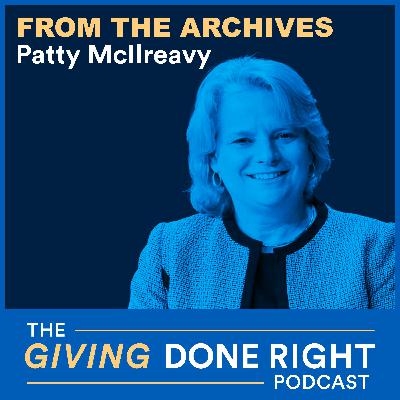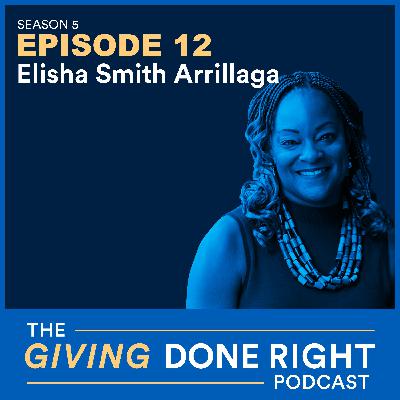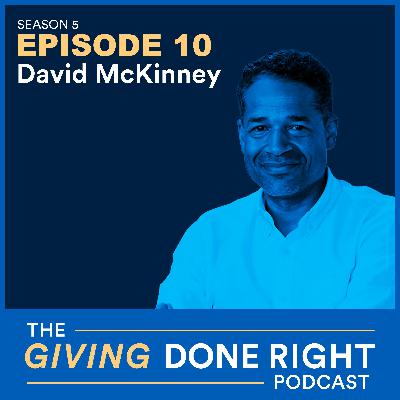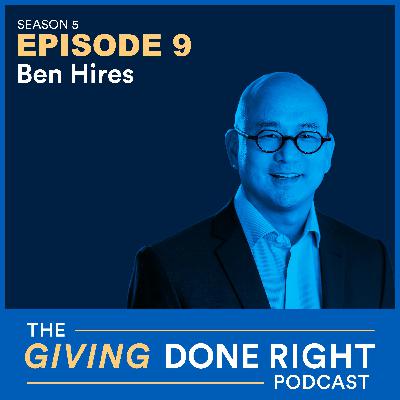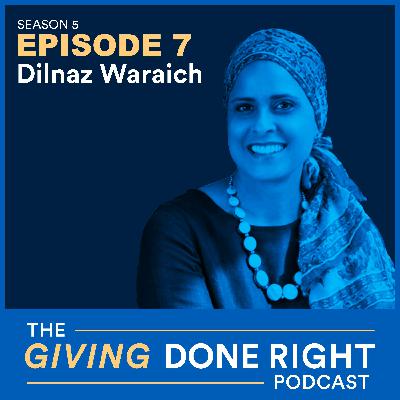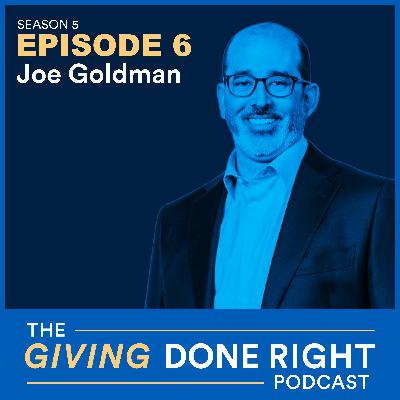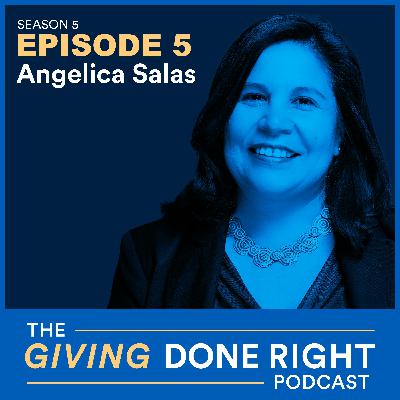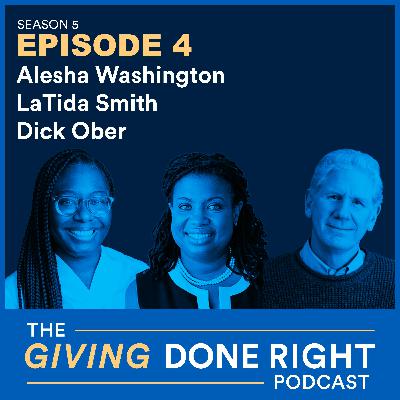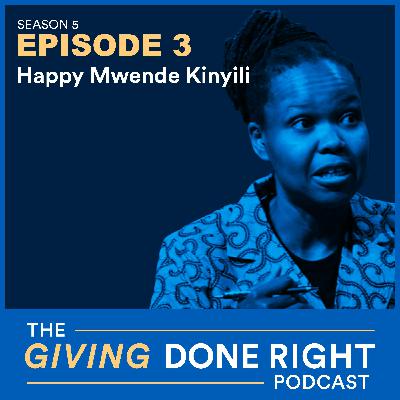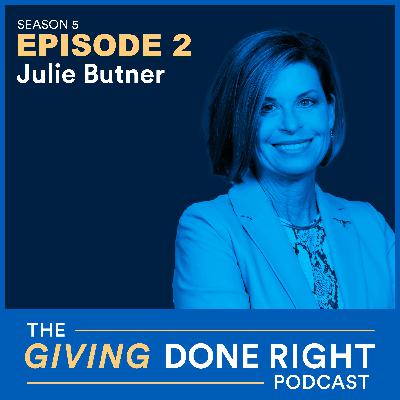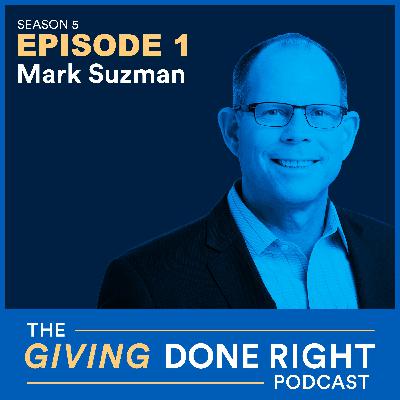Discover Giving Done Right
Giving Done Right

Giving Done Right
Author: The Center for Effective Philanthropy
Subscribed: 21,016Played: 89,669Subscribe
Share
© 2020
Description
From the Center for Effective Philanthropy (CEP), Giving Done Right is the show with everything you need to know to make an impact with your charitable giving. Whether you’re donating a few hundred dollars a year, a few thousand, or a few million, you might find yourself wondering: Where should I give? How do I know which nonprofits are effective? How do I know if I’m really making a difference with my donation? Join hosts Phil Buchanan and Grace Nicolette as they welcome leaders and experts from throughout the nonprofit sector to answer philanthropy’s burning questions and bust some myths that have long plagued donors and nonprofits alike. In a time when effective giving is especially crucial, Giving Done Right cuts through the noise and focuses on what you need to know to put your money to work.
62 Episodes
Reverse
This week on Giving Done Right, we’re introducing you to another podcast we love: Nonprofits Now: Leading Today, from The Chronicle of Philanthropy. In this episode, two leaders, Kathleen St. Louis Caliento and Nick Grono, join Chronicle CEO Stacy Palmer to explain how they have engaged their board in financial efforts.
As nonprofits face economic headwinds — including losses in federal funding, rising costs, and the possibility of a global recession — nonprofit boards play an increasingly essential role. Trustees help with strategy and can also be powerful donors and fundraisers. Yet fewer than a quarter of respondents to a Chronicle survey described their board members as enthusiastic fundraisers.
Grono and St. Louis Caliento share their advice on how to inspire boards to champion your mission and share insights from their shared experience of working with trustees to manage unrestricted, multimillion-dollar grants from MacKenzie Scott.
St. Louis Caliento runs Cara Collective, a Chicago nonprofit that helps low-income people find jobs. Grono heads the Freedom Fund, an organization that pools funds from donors who want to fight modern-day slavery. He’s the author of “How to Lead Nonprofits: Turning Purpose into Impact to Change the World,” published in 2024.
We want to hear from you about how the conversations on this podcast are making a difference in your approach to philanthropy. If our show has helped you, we want to hear about it! Can you take a few moments to send us a voice memo to gdrpodcast@cep.org?
Please include your name, institutional affiliation if you have one, role, and the answer to these questions: What specific ways has Giving Done Right influenced your giving and the way you think about philanthropy? And if it hasn't, what topics would you like to hear that would help?
Share your voice memo with us at gdrpodcast@cep.org. We can’t wait to hear from you! Thanks for listening!
As the current federal administration makes sweeping cuts to social safety net programs, political divisions deepen, and the guardrails of American democracy are tested, what is philanthropy’s role in this precarious time?
In the final episode of this season, Phil Buchanan and Grace Nicolette interview New York Times columnist and podcast host Ezra Klein live at CEP’s 2025 conference. Klein contends that America needs to renew a politics of plenty, face up to the failures of liberal governance, and abandon what he calls the chosen scarcities that have deformed American life. But what does this analysis mean for philanthropy, particularly at a moment of so many competing and urgent crises?
Additional Resources:
“Mounting Pressure: U.S. Foundations and Nonprofits on the 2025 Political Climate”
Elisha Smith Arrillaga, Ph.D. on the Giving Done Right podcast
“Abundance,” by Ezra Klein and Derek Thompson
Effective disaster giving often begins before a disaster even occurs. So says Patty McIlreavy, president and CEO of the Center for Disaster Philanthropy, in this popular episode from the Giving Done Right archives. In conversation with hosts Phil Buchanan and Grace Nicolette, Patty offers insight into how donors can support disaster prevention by focusing on reducing vulnerabilities as well as support recovery efforts, and the most common pitfalls for donors to consider when responding to disasters. Patty shares her deep expertise on what can make disaster giving successful (or unsuccessful) and the three discuss examples that still hold lessons for donors looking to mitigate disasters — or prevent them — today.
Additional Resources:
Center for Disaster Philanthropy
From Rapid Response to Sustainable Solutions: Disaster Response and Recovery in Post-Earthquake Haiti – Harvard Humanitarian Initiative Report
“Complex Humanitarian Emergencies: Where Crisis, Conflict, Climate, and COVID Meet” – Center for Disaster Philanthropy
Disasters, Dollars And Decisions: Lessons For Nonprofits To Prioritize Where And How To Help – Forbes
Unprecedented Times Call For Unprecedented Actions – Forbes
Asset-Based Framing: Trabian Shorters
Federal funding cuts and increased demand for their services have left nonprofits across the country and issue areas reeling, with many questioning whether they will survive. The consequences are stark, given the vital work nonprofits do in communities across the country. In this episode, CEP Vice President of Research Elisha Smith Arrillaga, Ph.D. shares just-collected data on what nonprofits are experiencing, exploring questions like which nonprofits have been hardest hit and what steps organizations are taking to respond.
She also talks with Phil Buchanan about data on the foundation response to the situation, exploring lessons for individual and institutional donors alike. Smith Arrillaga argues that the existential challenges nonprofits are facing require bold, values-driven responses from donors.
Additional Resources:
New CEP Research: “Mounting Pressure: U.S. Foundations and Nonprofits on the 2025 Political Climate”
CEP’s annual “State of Nonprofits” report for 2025, published May 2025
March 2025 CEP Research snapshot: “Challenging Times”
A compilation of additional resources for funders on responding to the current context on the CEP blog
What happens when education reform takes place without the input or engagement of the young people who will experience its effects? Conversely, what happens when youth voices lead the way to change? Phil Buchanan and Grace Nicolette sit down with their CEP colleague David McKinney, vice president of YouthTruth — a CEP initiative — to discuss how systematically listening to young people at scale can transform education, both at the school and system level.
David shares not only his own formative experiences facing exclusion as a young person, but draws on data collected from more than 3 million student surveys YouthTruth has administered to offer powerful examples of how schools have used student voice to close achievement gaps, address bullying, improve belonging, and build stronger communities. He also challenges common assumptions that have undergirded education reforms for decades, including top-down approaches and using common metrics of success, like test scores, in isolation.
Additional Resources:
YouthTruth
Aspen Institute
TNTP
Public Allies
YouthTruth’s “Youth Civic Empowerment” Report
“The Anti-Bullying Report” from YouthTruth
Questions about YouthTruth’s work? Reach out to David at david.mckinney@youthtruth.org
How does the "model minority myth" impact how funders view and support Asian immigrant communities? What role do disaggregated data play in ensuring their thriving? In a conversation with Ben Hires, CEO of the Boston Chinatown Neighborhood Center (BCNC), hosts Phil Buchanan and Grace Nicolette dig into the vast array of services that BCNC — and nonprofits like it — provide and the crucial role they play in mitigating the challenging realities facing Asian immigrants today, from ICE enforcement creating a climate of fear to long-standing funding gaps that leave essential services underfunded.
Ben explains why translation services as well as robust and disaggregated datasets are foundational to ensuring immigrant communities are well served, and why supporting both direct services and systemic change isn't an either-or proposition, but “a both-and.” Despite mounting challenges, Ben's message is unshakably optimistic: "The immigrant community, in particular, we know is resilient and strong and is not going away."
Additional Resources
Boston Chinatown Neighborhood Center (BCNC)
Pao Arts Center
Overlooked, Part One: Foundation Support for Asian American and Pacific Islander Leaders and Communities
The Asian American Foundation (TAAF)
STAATUS Index by TAAF
The Asian Community Fund at the Boston Foundation
Asian Pacific Islander Civic Action Network in Massachusetts
Is the fundamental right to give according to one’s values under attack in America? Phil Buchanan and Grace Nicolette talk with two influential foundation leaders who are sounding the alarm and fighting back. Tonya Allen, president of the McKnight Foundation, and John Palfrey, president of the John D. and Catherine T. MacArthur Foundation, discuss the Unite in Advance initiative — a coalition defending philanthropic rights — and the broader issue of giving as a crucial first amendment right.
The conversation explores why these leaders believe we're at a critical moment for U.S. civil society, how funders can increase their giving while continuing work on big goals like racial equity and halting climate change, and what individual donors can do to protect the American tradition of charitable giving.
Unite in Advance
McKnight Foundation
John D. and Catherine T. MacArthur Foundation
CEP Blog: “A Wave Forming? Funders Taking Action in Response to a Challenging Context”
Council on Foundations
Independent Sector
National Council of Nonprofits
GroundBreak Coalition
More Perfect
Press Forward
Giving Done Right episode featuring Julie Butner
What does it mean to tell the Muslim American story of generosity? Why is it important to talk about "religious justice" in philanthropy alongside other forms of justice? These are questions that President of the WF Fund and philanthropic advocate Dilnaz Waraich explores with hosts Phil Buchanan and Grace Nicolette as she shares her journey from kitchen table conversations about giving back to leading narrative change work that highlights Muslim American generosity.
In this episode, Dilnaz discusses Islamic principles behind charitable giving, why trust-based philanthropy requires humility, and how interfaith bridge-building strengthens communities. She also offers candid insights about her mistakes as a donor, the power of storytelling in philanthropy, and why "you're just enough" might be the encouragement hesitant donors need to hear right now.
Additional Resources
WF Fund
Inspired Generosity: stories of Muslim American generosity
National Center for Family Philanthropy
Indiana University Lilly School of Philanthropy
“The Next Day” by Melinda French Gates
Connections for the Homeless
Equal Justice Initiative
PBS documentary series: “American Muslims: A History Revealed”
President of the Democracy Fund Joe Goldman offers both urgency and clarity for donors concerned about the U.S.’ democratic backslide into authoritarianism in this conversation. As the second Trump administration consolidates power, he offers a practical three-part framework for strategic, democracy-focused giving: strengthening guardrails, powering breakthrough strategies, and working toward reconstruction.
In a conversation that grapples with difficult questions about donor fear and the paralyzing sense of overwhelm that many feel when considering the breadth of threats to democracy right now, Goldman shares specific examples of organizations doing critical work, and an array of ways that donors can get involved. His message is clear: "Courage breeds more courage. Solidarity breeds more solidarity."
Additional Resources
Democracy Fund
Democracy Fund Voice
Free DC
Press Forward
More Equitable Democracy
Protect Democracy
Democracy Forward
Institute for Constitutional Advocacy and Protection at Georgetown Law
Government Accountability Project
GovAct
States United
Community Change
New America
Demos
Unite in Advance
“Hope in the Dark” by Rebecca Solnit
“Eichmann in Jerusalem: A Report on the Banality of Evil” by Hannah Arendt
As ICE raids and warrantless arrests by masked federal agents take place around the U.S., Angelica Salas, executive director of CHIRLA (Coalition for Humane Immigrant Rights), joins hosts Phil Buchanan and Grace Nicolette to discuss the unprecedented scale of current immigration enforcement and its implications for everyone.
Angelica sheds light on what is happening on the streets and in processing and detention centers, including how individuals are being "disappeared,” due process is being denied, and the infrastructure supporting immigrant integration is being systematically dismantled. She also shares how CHIRLA and other immigrant rights organizations are fighting back through rapid response, documentation, advocacy, and in the courts. She offers hope through the remarkable story of how CHIRLA’s community stepped up to support them and the gathering tide of courage shown by advocates, activists, donors, and others.
In what she calls "a defining moment for our country" with implications well beyond immigration, she urges donors to support the ecosystem of immigrant rights, and shares her optimism that the U.S. can continue to be a country “built out of the many.”
Additional Resources:
CHIRLA - The Coalition for Humane Immigrant Rights
Raids Rapid Response Network (California)
Center for Migration Studies
National Day Labor Organizing Network
“Trump is Building His Own Paramilitary Force,” The Ezra Klein Show - The New York Times Opinion (podcast mentioned by Grace)
International Institute of Los Angeles
Donors looking to make a difference in their local communities can turn to community foundations — local philanthropic institutions driven by giving “of, by, and for the people” and rooted in the goal of creating thriving communities. In this episode, Phil and Grace are joined in conversation by three community foundation leaders: Dick Ober, president and CEO of the New Hampshire Charitable Foundation, LaTida Smith, president of the Winston-Salem Foundation, and Alesha Washington, president and CEO of the Seattle Foundation.
In sharing their experiences and approaches, these CEOs encourage donors to embrace their power to engage and effect change in their own community. They reflect on thorny issues including working across ideological lines, supporting often under-appreciated nonprofits and their staff, and the proliferation of giving options for donors. They also explore how to ensure money doesn't sit in institutions, but gets out the door to organizations working in communities.
Additional Resources:
CEP Report: What Donors Value: How Community Foundations Can Increase Donor Satisfaction, Referrals, and Future Giving
Community Foundation Locator, by Council on Foundations
Winston-Salem Foundation
Seattle Foundation
New Hampshire Charitable Foundation
Data on Declining U.S. Donor Participation, from the Lily Family School of Philanthropy at Indiana University
CEP Reports: State of Nonprofits 2025, 2024, and 2023
What happens when $2.83 billion disappears from women's rights funding globally? Conversely, what is possible when donors break out of traditional silos to work collaboratively with the goal of abundance and liberation for all? Phil Buchanan and Grace Nicolette talk with Happy Mwende Kinyili, co-executive director of global feminist fund Mama Cash to explore this unprecedented crisis — and discover surprising reasons for hope.
Happy shares powerful stories from Kenya to Argentina, explaining how participatory grantmaking creates lasting change and why "the people who've gotten us into this mess aren't going to get us out of it." For donors feeling overwhelmed by massive global needs or the frustrating retrenchments of recent years, Happy offers their own mother's wisdom: "Don't try to do everything, do something." Learn how small actions can have huge impact, why trust-based philanthropy works, and how co-leadership models are reshaping organizations.
Additional Resources
Mama Cash
Green Girls Platform
Sendai Framework for Disaster Risk Reduction
Urgent Action Fund
Mark Suzman on the Giving Done Right Podcast
CEP’s Three Year Study on the Impact of MacKenzie Scott’s Large, Unrestricted Gifts
As federal funding cuts shift more responsibility for food insecurity to local communities, Phil Buchanan and Grace Nicolette talk with Julie Butner, president and CEO of the Tarrant Area Food Bank, one of the largest food banks in the United States serving 13 counties around Fort Worth, Texas.
Julie reveals that food bank clients are often working families who simply can't afford basic necessities and explains how modern food banks have evolved far beyond emergency food distribution to address root causes through healthcare partnerships, nutrition education, and community gardens. This eye-opening conversation challenges common misconceptions about who needs food assistance and addresses debates about the roles of government and private philanthropy. Julie also offers practical guidance on how donors can make the greatest impact, whether through volunteering, financial support, or advocacy.
Additional Resources
Tarrant Area Food Bank
United for ALICE data
Feeding America food bank locator
The dismantling of USAID has created the most profound crisis in international development in decades, threatening to reverse years of progress in public health globally. In the season five premier of Giving Done Right, Phil Buchanan and Grace Nicolette talk with Mark Suzman, CEO of the Gates Foundation, about what this means and how donors can respond.
Suzman also shares candid insights about the Gates Foundation's work, including its evolving strategy and Bill Gates' recent announcement committing to spending down $200+ billion in assets by 2045. He offers advice to donors on making a difference in large-scale, global efforts, shares why "one of the huge comparative advantages of philanthropy is being able to take a little bit of risk," and speaks to the role of AI in programs from math education to innovative HIV prevention.
Additional Resources
Gates Philanthropy Partners
CARE
Save the Children
UNICEF
Global Fund to Fight AIDS, TB and Malaria
Friends of the Global Fight
The End Fund
YouthTruth
YouthTruth report, “Making Sense of Learning Math: Insights From the Student Experience”
The Gates Foundation’s announcement about spending down
As shifts to federal policy and funding profoundly impact domestic nonprofits and civil society as well as international aid, it has never been more vital that donors act decisively, urgently, and wisely.
This season, on the Giving Done Right podcast, hosts Phil Buchanan and Grace Nicolette dive deep with philanthropic and nonprofit leaders and experts to shed light on the rapidly shifting landscape of need and the crucial but complex role of charitable giving in filling critical gaps. They’ll tackle pressing questions many donors are grappling with right now, from how to think about their giving as key government institutions and social safety nets are dismantled, to how everyday donors can effectively support democratic institutions. Follow along with season five of Giving Done Right for crucial, informative, and uplifting conversations about how to make your charitable giving as effective – and joyful — as it can be.
Nashlie Sephus, Ph.D. brought her passion for technology and experience as an entrepreneur back to her hometown of Jackson, Mississippi to bridge the technology gap and plant the seeds for a thriving community. Nashlie joins Phil and Grace in the season four finale to share how the nonprofit she founded, Bean Path, went from informal drop-in hours at the local library to a vital community organization with event spaces, expert-taught courses, and a growing track record of success in helping people of all ages gain essential tech skills. Nashlie also shares what surprised her about moving from the business world to running a nonprofit and offers advice for other donors with a vision.
Additional Resources
The Bean Path
Praxis
Society of Women Engineers
Philanthropy has been the subject of intensifying criticism, so how should donors think about their role in creating a better world? Beth Breeze, Ph.D., director of the Centre for Philanthropy at the University of Kent, has spent more than a decade examining and responding to critiques of philanthropy, most recently authoring the 2021 book, “In Defence of Philanthropy.” In conversation with Phil and Grace, she makes the case that the critics are largely getting it wrong, overlooking the positive results of giving and the unique role that civil society and nonprofits play in any thriving democracy.
Additional Resources
In Defence of Philanthropy by Beth Breeze
University of Kent Centre for Philanthropy
Winners Take All: The Elite Charade of Changing the World by Anand Giridharadas
Munk Debate on Billionaire Philanthropy: Rob Reich vs. Beth Breeze
The Roddick Foundation
Empire of Pain: The Secret History of the Sackler Dynasty by Patrick Radden Keefe
As we begin a new year, we’re sharing a classic from the Giving Done Right archive in which Phil and Grace talk with Paul Niehaus, co-founder and chairman of GiveDirectly. Paul discusses the power of direct cash transfers – how they work, why trusting those in need with cash can be extremely effective, and when certain issue areas might warrant a different philanthropic approach. They also discuss the effective altruism movement and how to consider giving domestically versus internationally.
Additional Resources
GiveDirectly
Cash transfer research via GiveDirectly
GiveWell
The Most Good You Can Do: How Effective Altruism is Changing Ideas About Living Ethically by Peter Singer
Universal Basic Income project in Kenya
From his days as mayor of San Antonio, Texas to serving as a Cabinet Secretary under former President Barack Obama to leading the nation's largest Latino-serving foundation, Julián Castro has always sought to create positive change in people's lives. As CEO of the Latino Community Foundation, Julián joins Phil and Grace to discuss his vision for a thriving Latino community in the U.S., sharing how philanthropy can enhance civic engagement and improve educational, health, and employment outcomes for Latinos. They also delve into the implications of the 2024 election results, including the shift rightward among at least a segment of Latino voters, the incoming Trump administration’s potential implementation of mass deportations, and challenges to the nonprofit sector broadly including proposed legislation in Congress.
Additional Resources
Latino Community Foundation
UnidosUS
H.R.9495 - Stop Terror-Financing and Tax Penalties on American Hostages Act



